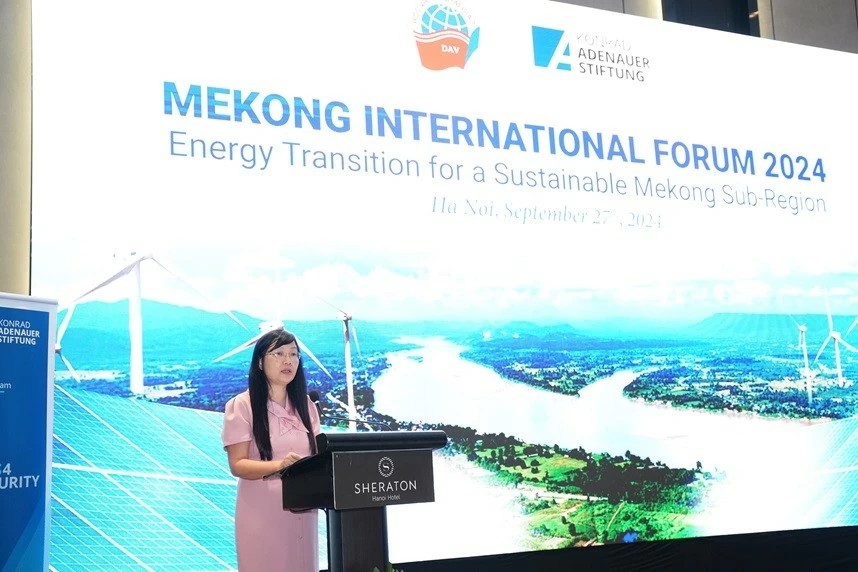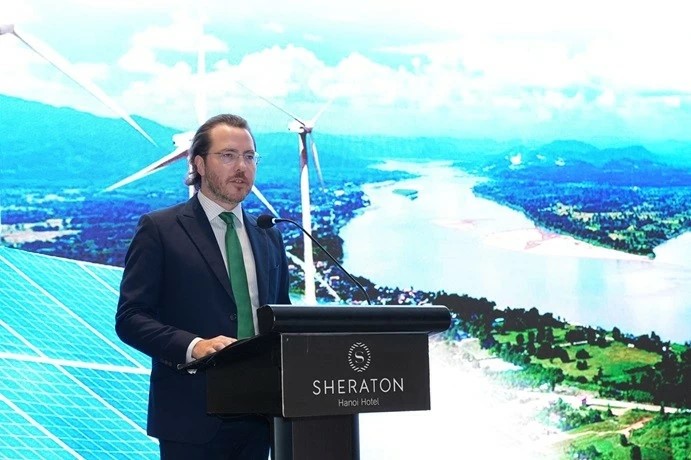Shaping sustainable energy future for Mekong Sub-Region
The forum is expected to identify best practices and policy synergies for regional energy transition while strengthening multi-stakeholder engagement in green energy development.
The Mekong International Forum 2024, themed “Energy Transition for a Sustainable Mekong Sub-Region” jointly organized by the Diplomatic Academy of Vietnam (DAV) and the Konrad Adenauer Stiftung (KAS) has enhanced understanding of the geopolitical and energy landscape in the Mekong Sub-Region.
| Dr. Pham Lan Dung, Acting President of the Diplomatic Academy of Vietnam, speaks at the forum held in Hanoi on September 27. Photos: Tra My |
With three sessions namely: Geopolitical Landscape and Energy Security of the Mekong Sub-region, Best Practices and Policy Synergy for Regional Energy Transition, and The Role of Partners and Multi-stakeholders in Energy Transition, the forum provided strategic recommendations for technology implementation and Policy Alignment with 18 international speakers and more than 100 attendees from various sectors, including government agencies, local authorities, academic institutions, embassies, and international organizations based in Vietnam.
Discussions focused on the challenges of energy transition in the region, emphasizing the critical need for cooperation and innovative approaches to foster sustainable energy development in the Mekong Sub-Region.
In a keynote speech, Dr. Pham Lan Dung, Acting President of the Diplomatic Academy of Vietnam, highlighted the growing importance of energy transition in the face of climate change and increasing energy demands.
She stressed that energy transition is more than just an economic change; it represents a deeper shift in development priorities, with a focus on environmental sustainability, social equity, and people’s well-being. For the Mekong Sub-Region, this transition has become a pressing need in response to global trends.
| Florian C. Feyerabend, Resident Representative of KAS in Vietnam, addresses issues the region faces in energy transition. |
Florian C. Feyerabend, Resident Representative of KAS in Vietnam, echoed Dr. Dung’s remarks, stressing the region’s vulnerability to the effects of climate change. With rapid industrialization and rising energy demands, the urgency for sustainable energy solutions is higher than ever. While the region is rich in energy resources, continued innovation and international collaboration are essential to ensure a successful transition.
During the morning session, experts gave insightful presentations and participated in dynamic discussions on the geopolitical landscape and energy security in the Mekong Sub-Region. They tackled geopolitical challenges, shared practical experiences, explored avenues for collaboration, and proposed sustainable solutions. Despite the region’s significant potential for energy transition, water sovereignty emerged as a key obstacle hindering progress.
Among those was an engaging quiz led by Dr. Vu Le Thai Hoang, sparking enthusiasm and increasing awareness about the region’s pressing energy issues. Thought-provoking questions not only boosted participants’ knowledge but also highlighted the importance of joint efforts to address energy challenges and move towards sustainable solutions.
| A panel discussion. |
Other obstacles, such as competition among major powers, technological constraints, infrastructure deficiencies, and financial hurdles, were also discussed. In this context, speakers stressed the importance of trust-building, dialogue, and policy coherence to enhance collaboration, improve energy efficiency, and promote sustainable development in the region.
The fourth session turned its attention to the crucial role of collaboration among multiple stakeholders in achieving a successful energy transition. Participants explored how governments and private sector players can collaborate to establish a supportive environment for sustainable energy projects.
The Mekong International Forum 2024 wrapped up with a set of robust recommendations aimed at boosting regional cooperation on sustainable energy. It stated that a successful energy transition in the Mekong Sub-Region would not only contribute to global climate objectives but also enhance energy security, stimulate economic growth, and improve the quality of life for millions in the region.











